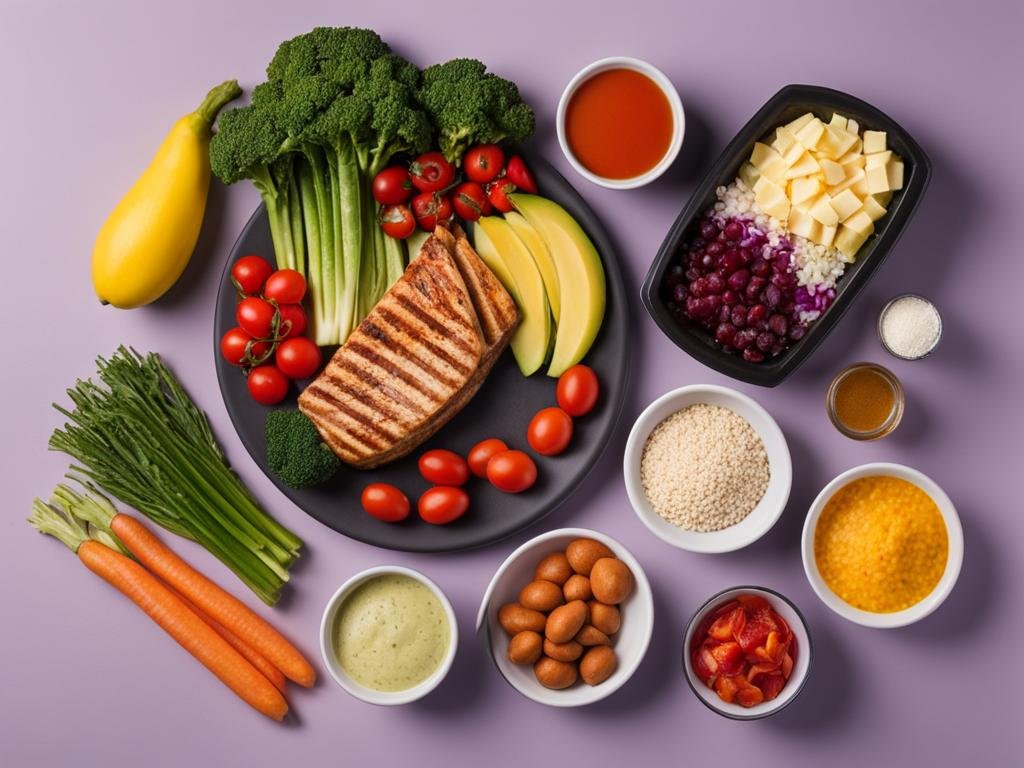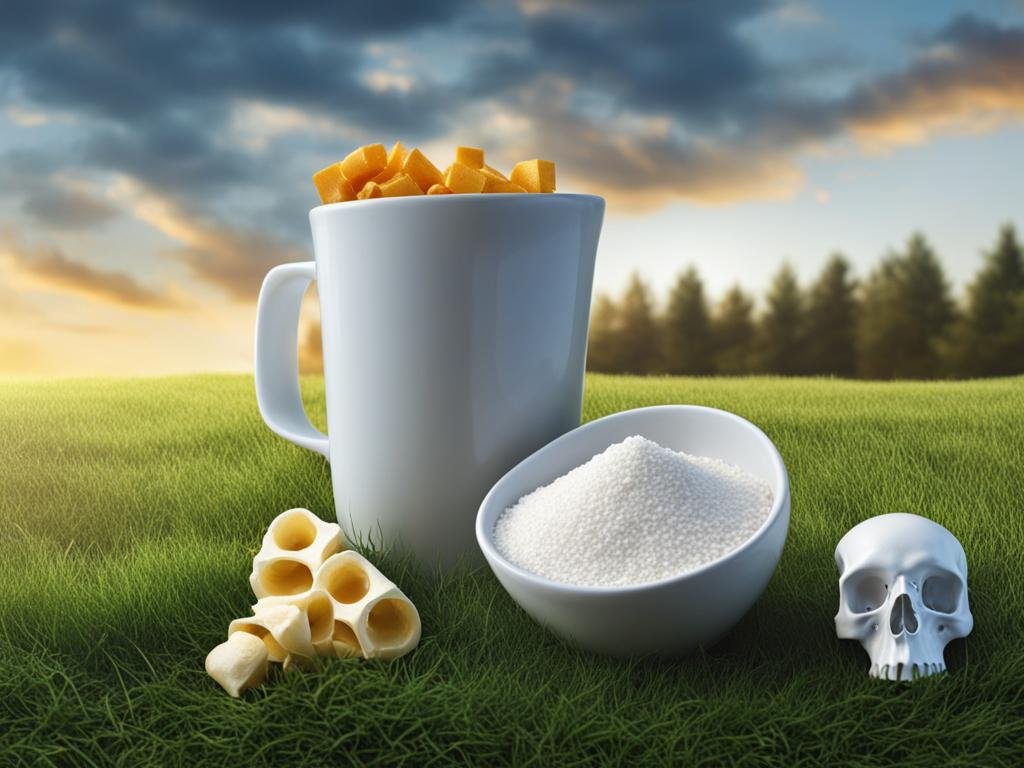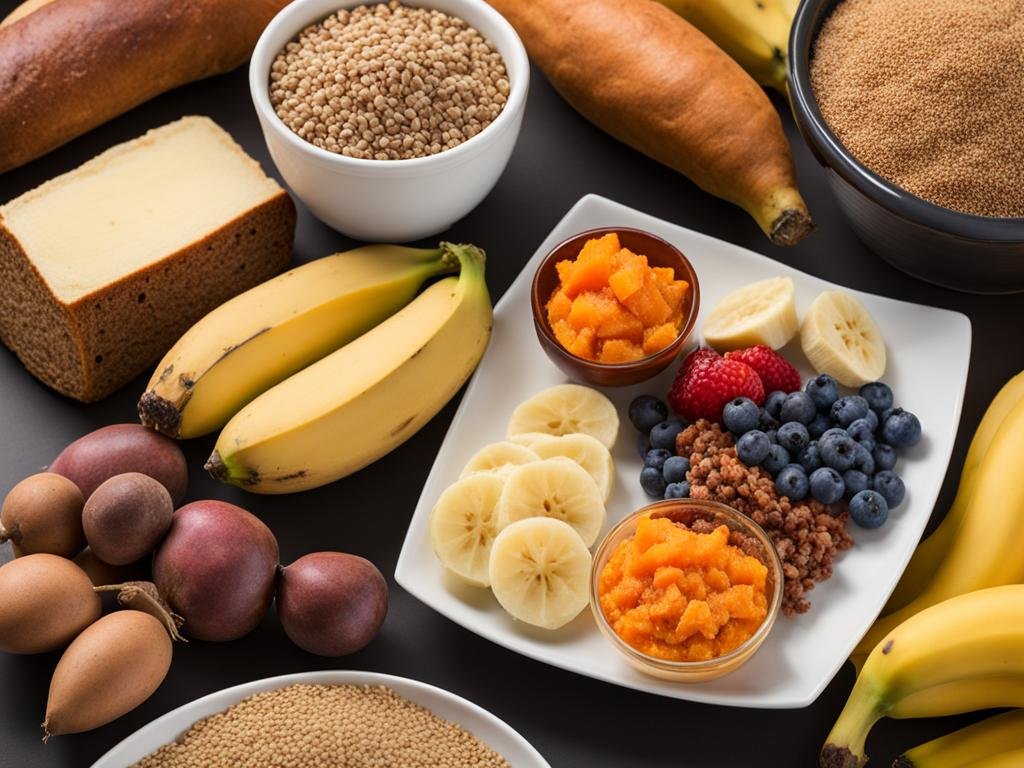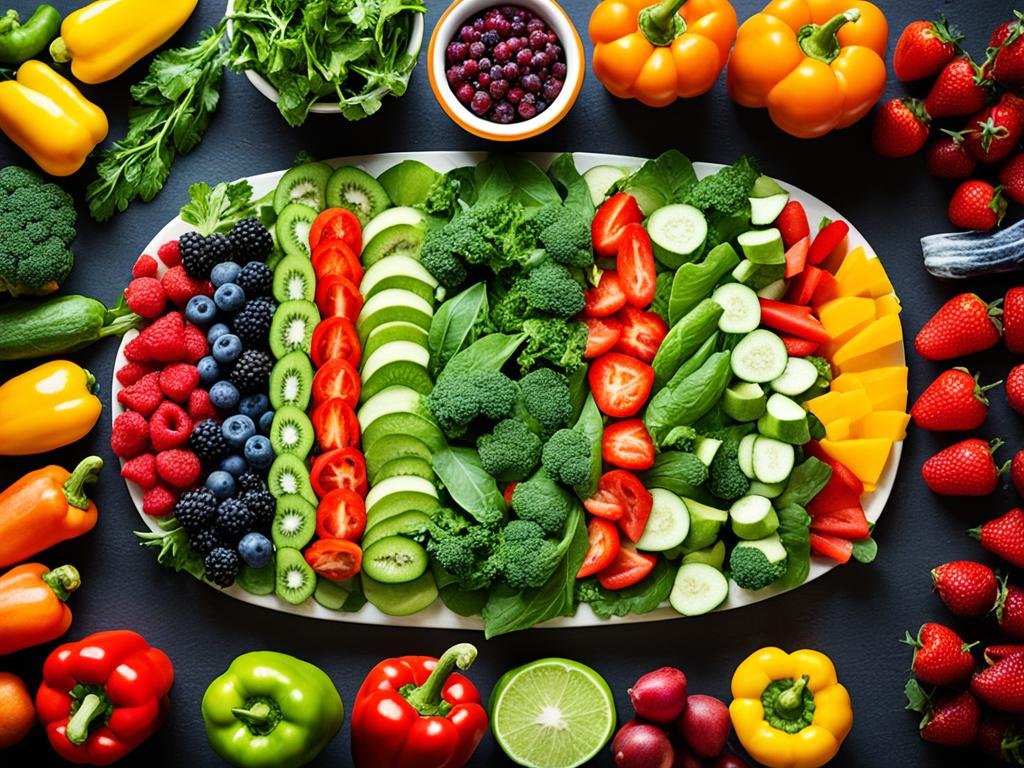Achieving peak athletic performance requires more than just physical training and practice. It also necessitates a foundational pillar of success: proper nutrition. Nutrition plays a crucial role in fueling your body, enhancing muscle recovery, and optimizing your performance as an athlete. By adopting healthy eating habits and following a well-designed athlete nutrition plan, you can unlock your true athletic potential and achieve your goals.
To build a performance-enhancing diet, it is important to understand the specific nutrient needs of athletes and how to tailor your nutrition plan accordingly. By incorporating performance-enhancing foods and implementing strategies to maximize muscle recovery and energy levels, you can take your athletic performance to the next level.
Throughout this article, we will provide you with a comprehensive guide to essential nutrition for athletes. From understanding macronutrients to identifying the importance of micronutrients, we will cover all aspects of building a performance-enhancing diet. We will also explore hydration strategies, the significance of carbohydrate loading, protein intake recommendations, and the benefits of sports drinks.
Whether you’re a professional athlete or a dedicated enthusiast, optimizing your nutrition is key to your success. Let’s dive in and discover how to fuel your body for peak performance.
Key Takeaways:
- Sports nutrition is essential for enhancing athletic performance and overall health.
- Healthy eating habits and a well-designed athlete nutrition plan can optimize energy levels and muscle recovery.
- Macronutrients, such as carbohydrates, proteins, and fats, play a vital role in fueling the body and supporting athletic performance.
- Proper hydration is crucial for maintaining optimal performance, and sports drinks can provide energy replacement and electrolyte balance.
- Working with a sports dietitian can help tailor your nutrition plan and overcome dietary challenges.
The Importance of Tailored Athlete Nutrition Plans
Athletes have unique nutritional needs that vary based on their sport, training schedule, and individual goals. A tailored athlete nutrition plan takes into account macronutrients for growth and energy, the timing of meals for optimal performance, and customizing the diet to meet the specific demands of the sport. Understanding the role of macronutrients and how they fuel the body, as well as the importance of nutrient timing and adjusting the diet to match the athlete’s specific needs, is key to optimizing athletic performance and achieving optimal results.
Understanding Macronutrients for Growth and Energy
Macronutrients are essential for athletes to fuel their bodies and support growth and energy. These macronutrients include carbohydrates, proteins, and fats. Carbohydrates provide a primary source of energy, especially for high-intensity activities. Proteins are important for muscle repair and growth, while fats offer concentrated energy. Understanding the role of each macronutrient and incorporating them into an athlete’s diet is crucial for optimal performance.
Timing Your Meals for Optimal Performance
The timing of meals plays a significant role in an athlete’s performance. Pre and post-workout nutrition are essential for providing the necessary energy and promoting muscle recovery. Consuming the right nutrients at the right time can enhance energy levels, improve endurance, and maximize performance during training and competitions. Nutrient timing allows athletes to optimize their fueling strategies and get the most out of their workouts.
Customizing Your Diet for Specific Athletic Demands
Each sport has unique demands that require specific adjustments to an athlete’s diet. Tailoring the nutrition plan based on the sport can help improve performance and prevent deficiencies or excesses. For example, endurance athletes may require more carbohydrates for sustained energy, while strength athletes may focus on protein for muscle repair and growth. By customizing the diet to match the demands of the sport, athletes can optimize their performance and achieve their goals.
Mastering Macronutrients: The Athlete’s Fuel
Macronutrients play a crucial role in fueling the body and supporting overall athletic performance. Understanding the role of each macronutrient is essential for designing an effective athlete nutrition plan.
Carbohydrates serve as the primary fuel source for high-intensity activities and should make up a significant portion of an athlete’s diet. They provide the energy necessary for intense workouts and help replenish glycogen stores. Good sources of carbohydrates include whole grains, fruits, and vegetables.
Proteins are essential for muscle repair and growth. They aid in the recovery process after intense workouts and help build lean muscle mass. Athletes should include protein-rich foods such as lean meats, poultry, fish, dairy products, and legumes in their diet.
Fats provide a concentrated source of energy and play a role in hormone production and nutrient absorption. Healthy sources of fats include avocados, nuts, seeds, and olive oil. Athletes should consume adequate amounts of healthy fats while avoiding excessive saturated and trans fats.
An effective athlete nutrition plan should consist of a balanced combination of macronutrients to optimize energy levels, support muscle recovery, and enhance athletic performance.

| Macronutrient | Role | Food Sources |
|---|---|---|
| Carbohydrates | Primary fuel source for high-intensity activities | Whole grains, fruits, vegetables |
| Proteins | Crucial for muscle repair and growth | Lean meat, poultry, fish, dairy products, legumes |
| Fats | Concentrated source of energy and role in hormone production | Avocado, nuts, seeds, olive oil |
Hydration Strategies for Peak Athletic Performance
Proper hydration is crucial for athletes in order to maintain optimal performance and achieve peak athletic results. Dehydration can significantly impair both physical and cognitive function, leading to decreased performance and potentially hindering overall athletic success. To ensure you stay properly hydrated and maximize your performance, it is essential to understand the importance of hydration, the recommended fluid intake for athletes, and effective strategies for staying hydrated before, during, and after exercise.
Hydration serves as the foundation for peak athletic performance. By maintaining adequate fluid levels, you can enhance your endurance, speed up recovery, and prevent dehydration-related performance declines. The key is to have a well-structured hydration plan that supports your body’s fluid requirements throughout your training and competition.
“Hydration serves as the foundation for peak athletic performance.”
Before exercise, it is essential to start with a hydrated body. Drink fluids regularly in the hours leading up to your training or competition to ensure you begin in a well-hydrated state. During exercise, aim to drink fluids at regular intervals to replace the fluids lost through sweat. The longer and more intense your activity, the more important it is to hydrate adequately. After exercise, prioritize replenishing the fluids and electrolytes lost during the activity to support optimal recovery.
The recommended fluid intake for athletes may vary depending on factors such as body weight, exercise duration and intensity, environmental conditions, and individual sweat rates. In general, a good guideline is to drink 16-24 ounces of fluid for every pound of body weight lost during exercise. It is also important to listen to your body’s thirst cues and drink fluids before you feel excessively thirsty.
Hydration Strategies for Peak Athletic Performance
- Start exercise well-hydrated by drinking fluids regularly in the hours leading up to your activity.
- During exercise, drink fluids at regular intervals to replace the fluids lost through sweat.
- After exercise, prioritize replenishing fluids and electrolytes lost during the activity for optimal recovery.
- Consume fluids based on individual sweat rates and environmental conditions.
- Monitor your body’s thirst cues and drink fluids before you feel excessively thirsty.
| Pre-Exercise | During Exercise | After Exercise |
|---|---|---|
| – Drink fluids regularly in the hours leading up to your activity. | – Drink fluids at regular intervals to replace fluids lost through sweat. | – Prioritize replenishing fluids and electrolytes lost during the activity. |
| – Consume fluids based on individual sweat rates and environmental conditions. | ||
| – Monitor your body’s thirst cues and drink fluids before feeling excessively thirsty. |
Vital Micronutrients: Small Compounds, Big Impact
While macronutrients play a significant role in providing energy, micronutrients are equally important for athletes’ overall health and performance. This section will highlight the importance of essential micronutrients for athletes, including their role in bone health, oxygen delivery, and muscle and nerve function.
Calcium and Vitamin D for Bone Health
Calcium and vitamin D are essential micronutrients for athletes, particularly for maintaining bone health. Calcium is crucial for bone strength and density, while vitamin D helps the body absorb and utilize calcium effectively. Athletes who engage in high-impact activities are at a higher risk of bone fractures and should ensure adequate intake of calcium and vitamin D to support bone health and prevent injuries.
Iron’s Role in Oxygen Delivery
Iron is a vital micronutrient that plays a crucial role in oxygen delivery throughout the body. During exercise, oxygen-carrying red blood cells need iron to transport oxygen to the muscles. Iron deficiency can lead to decreased oxygen-carrying capacity, resulting in reduced athletic performance. Athletes, particularly those engaging in endurance sports, should consume iron-rich foods, such as lean meats, beans, and leafy greens, to support optimal oxygen delivery and enhance endurance.

Electrolytes for Muscle and Nervous System Function
Electrolytes are essential micronutrients that play a crucial role in muscle and nervous system function. They help maintain proper fluid balance, regulate muscle contractions, and support nerve impulses. Athletes who engage in intense workouts or prolonged physical activity lose electrolytes through sweat and must replenish them to avoid dehydration and muscle cramps. Consuming electrolyte-rich foods, such as bananas, oranges, and coconut water, can help athletes maintain electrolyte balance and optimize muscle and nervous system function.
Preventing Nutritional Deficits and Avoiding Excess
Balancing Energy Intake with Expenditure
Proper nutrition for athletes involves maintaining a balance between energy intake and expenditure. It’s crucial to consume an adequate amount of calories to fuel your physical activity, while also avoiding excessive or insufficient nutrition. To achieve this balance, consider the following:
- Evaluate your energy needs based on your sport, training intensity, and body composition goals.
- Calculate your total daily energy expenditure (TDEE) by considering your basal metabolic rate (BMR) and activity level.
- Adjust your calorie intake to match your energy expenditure, ensuring you have enough fuel for your workouts and recovery.
- Monitor your weight and performance regularly to determine if adjustments to your energy intake are necessary.
Recognizing Signs of Malnutrition in Athletes
It’s important for athletes to be aware of the signs of malnutrition to ensure they are meeting their nutritional needs adequately. Some common signs of malnutrition in athletes include:
- Unexplained weight loss or difficulty gaining weight
- Chronic fatigue and low energy levels
- Decreased endurance and performance
- Recurrent injuries or slow recovery
- Frequent illness or decreased immune function
- Poor concentration and cognitive function
- Changes in mood or behavior
If you experience any of these symptoms, it may be a sign of nutritional deficits or imbalances. Consulting with a registered dietitian who specializes in sports nutrition can help you identify and address these issues.
Maintaining a Healthy Body Weight and Composition
Achieving and maintaining a healthy body weight is important for optimal athletic performance. To maintain a healthy body weight and composition, consider the following strategies:
- Eat a balanced diet that includes a variety of nutrient-dense foods.
- Monitor your calorie intake and adjust it according to your activity level and goals.
- Focus on consuming high-quality carbohydrates, lean proteins, and healthy fats.
- Engage in regular strength training to build and maintain muscle mass.
- Stay hydrated and avoid excessive restriction or overconsumption of food.
- Seek guidance from a sports dietitian to create a personalized nutrition plan.
Carbohydrate Loading: Maximizing Energy Stores
Carbohydrate loading is a strategy commonly used by athletes to maximize their energy stores before a competition or event. By increasing their intake of carbohydrates in the days leading up to the event, athletes can ensure that their muscles are fully fueled and ready to perform at their best.
The Science Behind Carbohydrate Loading
Carbohydrate loading works by increasing the amount of glycogen, the stored form of carbohydrates, in the muscles. When glycogen stores are fully stocked, athletes have a greater supply of readily available fuel during prolonged exercise, allowing them to maintain their energy levels for longer periods.

Planning Your Carb-Intake Before Big Events
Planning your carbohydrate intake before big events is crucial for successful carbohydrate loading. The timing and quantity of carbohydrates consumed can significantly impact the effectiveness of this strategy. It’s recommended to start increasing carbohydrate intake 2-3 days before the event, gradually increasing the percentage of carbohydrates in your diet while reducing the intensity and duration of training.
A common rule of thumb is to aim for 7-10 grams of carbohydrates per kilogram of body weight per day during the loading phase. For example, a 70-kilogram athlete would need to consume 490-700 grams of carbohydrates per day. It’s important to choose carbohydrate-rich foods that are easily digested and well-tolerated to avoid gastrointestinal discomfort.
The Best Carbohydrate Sources for Athletes
Choosing the right carbohydrate sources is essential for effective carbohydrate loading. Opt for complex carbohydrates, such as whole grains, fruits, vegetables, and legumes, as they provide a steady release of energy and essential nutrients. Avoid foods high in added sugars or refined carbohydrates, as they can lead to rapid spikes and crashes in blood sugar levels.
Here are some excellent carbohydrate sources for athletes:
- Whole wheat bread and pasta
- Brown rice
- Quinoa
- Oats
- Sweet potatoes
- Fruits (bananas, berries, oranges)
- Vegetables (leafy greens, carrots, bell peppers)
- Legumes (beans, lentils, chickpeas)
By incorporating these carbohydrate sources into your diet leading up to a big event, you’ll ensure that your energy stores are optimized, allowing you to perform at your peak.
| Carbohydrate Source | Grams of Carbohydrates per Serving |
|---|---|
| Whole wheat bread (1 slice) | 13 |
| Brown rice (1 cup) | 45 |
| Quinoa (1 cup, cooked) | 39 |
| Oats (1/2 cup, dry) | 54 |
| Sweet potatoes (1 medium) | 24 |
| Banana (1 medium) | 27 |
| Spinach (1 cup) | 1 |
| Black beans (1/2 cup, cooked) | 20 |
Protein Intake for Athletes: More Than Just Muscle
Protein is an essential macronutrient for athletes, playing a vital role in muscle repair and growth. But its benefits extend far beyond building muscle. Protein also contributes to recovery, boosts the immune system, and supports various body functions. In fact, protein intake is crucial for optimizing athletic performance.
When you engage in intense physical activity, such as training or competing, your muscles undergo stress and damage. Consuming an adequate amount of protein after exercise promotes muscle repair and helps you recover faster, allowing you to perform at your best during your next training session or competition.
Moreover, protein plays a critical role in supporting other aspects of athletic performance. It assists in the production of enzymes, hormones, and antibodies, contributing to overall health and well-being. Protein also aids in maintaining a healthy body composition, as it provides a feeling of satiety, preventing overeating and supporting weight management.
To ensure you’re getting the right amount of protein for optimal athletic performance, it’s important to determine your individual protein needs. The recommended protein intake for athletes typically ranges from 0.8 to 2 grams per kilogram of body weight per day, depending on factors such as exercise intensity, duration, and training goals.
Keep in mind that protein requirements may vary among athletes, so it’s advisable to consult with a sports dietitian or nutritionist. They can assess your specific needs and help you develop a personalized protein intake plan tailored to your athletic goals and performance requirements.

By prioritizing protein intake and ensuring you consume an adequate amount, you can support muscle repair, enhance recovery, and optimize your athletic performance. Remember, protein is not just about building muscle but also about promoting overall health and well-being.
Sports Drink Benefits: Beyond Quenching Thirst
Sports drinks offer more than just hydration for athletes. They provide a convenient way to replace energy during extended activity and maintain electrolyte balance. Understanding the benefits and proper usage of sports drinks can help athletes optimize their performance and recovery.
Energy Replacement During Extended Activity
During prolonged physical activity, the body’s energy stores can become depleted. Sports drinks contain carbohydrates that can be quickly absorbed and converted into energy, providing athletes with a much-needed boost. These energy replacement drinks help sustain performance levels during long workouts or competitions, allowing athletes to maintain their intensity and endurance.
Understanding the Contents of Sports Drinks
Sports drinks typically contain a combination of carbohydrates, electrolytes, and fluids. The carbohydrates in these drinks help replenish glycogen stores in the muscles, while electrolytes like sodium and potassium help maintain the body’s electrolyte balance. Additionally, sports drinks often provide fluids to support hydration during exercise.
| Carbohydrates | Electrolytes | Fluids |
|---|---|---|
| Provide quick energy | Maintain electrolyte balance | Support hydration during exercise |
When Water Isn’t Enough: The Role of Sports Drinks
While water is essential for hydration, it may not provide sufficient electrolyte replacement and energy replenishment during intense exercise. In such cases, sports drinks can be a valuable addition to an athlete’s hydration strategy. The electrolytes in these beverages help prevent muscle cramps and maintain proper nerve and muscle function. By incorporating sports drinks into their routine, athletes can optimize their hydration and overall performance.
Overall, sports drinks offer more than just quenching thirst. They play a vital role in energy replacement, electrolyte balance, and hydration during exercise. By understanding the benefits and incorporating sports drinks strategically into their routine, athletes can enhance their performance and recovery.
Meal Prep for Athletes: Ensuring You’re Always Ready to Perform
As an athlete, it’s crucial to have convenient access to healthy, nutritious meals at all times. Meal prepping can be a game-changer, allowing you to save time, maintain proper nutrition, and always be ready to perform at your best. By mastering the art of meal prep, you can fuel your body with the right nutrients and stay on top of your game.
Here are some tips and strategies for meal prepping:
- Plan your meals: Take some time to plan your meals for the week, considering your training schedule and nutritional needs. Make a list of ingredients and recipes you’ll need.
- Cook in bulk: Prepare larger batches of food that can be portioned and stored for later. This will save you time and ensure you have meals ready to go.
- Prep ahead of time: Spend a few hours on a designated day to cook and portion your meals for the week. Use storage containers to keep everything organized.
- Focus on balance: Include a variety of nutrients in your meals, such as lean proteins, whole grains, fruits, vegetables, and healthy fats.
- Pre and post-workout meals: Plan your pre and post-workout meals in advance to ensure you have the necessary fuel for training and proper recovery.
- On-the-go nutrition: Prepare portable snacks and meals that you can take with you when you’re on the move. This will help you avoid unhealthy options when you’re rushed or away from home.
Meal prepping may require some initial effort and planning, but the benefits are worth it. You’ll have control over your nutrition, save money by avoiding eating out, and have peace of mind knowing that you’re fueling your body with the right foods.
So, get started with meal prep and take your performance to the next level!
Sports Dietitian: Your Guide for Performance Nutrition
Working with a sports dietitian can be highly beneficial for athletes seeking to optimize their performance through nutrition. A sports dietitian is a qualified professional who specializes in providing personalized nutrition plans and guidance specifically tailored to an athlete’s unique needs and goals.
A sports dietitian can help athletes develop a personalized nutrition plan that takes into account factors such as their sport, training schedule, body composition goals, and specific dietary requirements. By understanding the athlete’s individual needs and goals, the sports dietitian can create a nutrition plan that supports optimal performance and enhances overall health.
One of the major advantages of working with a sports dietitian is the ability to overcome dietary challenges. Athletes often face challenges such as food preferences, allergies, intolerances, and restrictions. A sports dietitian can provide practical solutions and alternatives to ensure that athletes are getting the nutrients they need, even in the face of these challenges.
Furthermore, a sports dietitian can help athletes track their progress and make adjustments to their nutrition plan as needed. By regularly monitoring and assessing an athlete’s progress, the sports dietitian can make targeted changes to optimize performance and achieve desired results. This may involve adjusting macronutrient ratios, altering meal timing, or addressing any nutrient deficiencies or imbalances.
Ultimately, working with a sports dietitian provides athletes with expert guidance and support in their nutritional journey. Through nutrition counseling and dietary guidance, athletes can gain a deeper understanding of how their diet impacts their performance and overall health. By tracking progress and making necessary adjustments, athletes can maximize their potential and achieve their performance goals.
Sports Nutrition and Diet: The Athlete’s Guide to Eating Right
In order to optimize your athletic performance, it is crucial to understand the role of sports nutrition and develop a healthy eating plan. Proper nutrition can enhance your energy levels, promote muscle recovery, and support overall health. This comprehensive guide will provide you with valuable information and strategies to make informed choices about your eating habits.
Nutrient Timing:
Timing is important when it comes to fueling your body for optimal performance. It is essential to consume the right nutrients before, during, and after exercise to provide sufficient energy and aid in recovery. By properly timing your meals and snacks, you can maximize your athletic potential and support your training goals.
Proper Hydration:
Hydration plays a vital role in athletic performance. Staying properly hydrated before, during, and after exercise is crucial for maintaining energy levels, regulating body temperature, and preventing dehydration. By incorporating adequate fluid intake into your daily routine, you can optimize your performance and recovery.
Pre and Post-Workout Nutrition:
What you eat before and after your workouts can greatly impact your performance and recovery. Fueling your body with the right combination of carbohydrates, proteins, and fats can provide the necessary nutrients for energy, muscle repair, and growth. This section will provide you with practical guidelines and suggestions for pre and post-workout nutrition to support your athletic goals.
Healthy Eating Strategies:
Athletes can benefit from adopting healthy eating strategies to maintain a well-balanced diet. This involves consuming a variety of nutrient-dense foods, including fruits, vegetables, whole grains, lean proteins, and healthy fats. By focusing on quality nutrition, you can provide your body with the necessary fuel and nutrients it needs to perform at its best.
Conclusion:
By following this athlete’s guide to eating right, you can optimize your sports nutrition and support your athletic performance. From nutrient timing to healthy eating strategies, each aspect plays an important role in enhancing your energy levels, promoting muscle recovery, and supporting overall health. By making informed choices about your eating habits, you can take your athletic performance to the next level.
Conclusion
In conclusion, optimizing athlete nutrition is crucial for maximizing performance and achieving athletic success. By implementing the right diet and incorporating nutrition knowledge into your routine, you can enhance your energy levels, improve muscle recovery, and support overall health. Here is a summary of the key points on athlete nutrition:
Summarizing Key Points on Athlete Nutrition
1. Macronutrients: Understand the role of carbohydrates, proteins, and fats in fueling your body for optimal performance.
2. Hydration: Stay properly hydrated before, during, and after exercise to maintain peak performance and prevent dehydration-related declines.
3. Micronutrients: Ensure adequate intake of essential nutrients like calcium, vitamin D, iron, and electrolytes to reduce the risk of injuries and optimize endurance.
4. Energy Balance: Strive for a balanced energy intake and expenditure to prevent nutritional deficits and maintain a healthy body weight and composition.
5. Meal Prep: Plan and prepare convenient, healthy meals in advance to ensure you always have the right nutrition on hand.
Implementing The Right Diet for Athletic Success
To implement the right diet for athletic success, it is important to:
1. Tailor Your Nutrition: Consider your specific sport, training schedule, and individual goals when designing your nutrition plan.
2. Work with a Sports Dietitian: Seek guidance from a professional who can provide personalized nutrition counseling and help overcome dietary challenges.
3. Measure Progress: Track your results and make necessary adjustments to optimize your diet and achieve your performance goals.
Next Steps: Integrating Knowledge Into Your Routine
Now that you have gained valuable knowledge about athlete nutrition, it’s time to integrate it into your routine. Here are some practical steps to help you apply your newfound knowledge effectively:
1. Plan your meals and snacks based on your specific nutrient requirements and training schedule.
2. Keep a food diary to track your nutrient intake and ensure you are meeting your goals.
3. Experiment with different foods and meal timing to find what works best for your body and performance.
Remember, consistency is key. By consistently implementing the right diet and incorporating your nutrition knowledge into your routine, you can optimize your performance and achieve your athletic goals.









